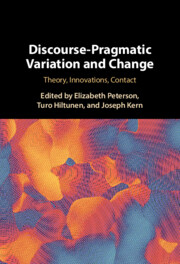Book contents
- Discourse-Pragmatic Variation and Change
- Discourse-Pragmatic Variation and Change
- Copyright page
- Contents
- Figures
- Tables
- Contributors
- Foreword
- Acknowledgments
- Abbreviations
- Introduction
- Part I Innovations in Theory and Method
- Part II Innovative Variables in English
- 5 An Emerging Pragmatic Marker
- 6 “That Is Totally Not My Type of Film”
- 7 Uh, What Should We Count?
- 8 Modeling Listener Responses
- Part III Language Contact Settings
- Afterword
- References
- Index
5 - An Emerging Pragmatic Marker
Sentence-Final Is All
from Part II - Innovative Variables in English
Published online by Cambridge University Press: 14 July 2022
- Discourse-Pragmatic Variation and Change
- Discourse-Pragmatic Variation and Change
- Copyright page
- Contents
- Figures
- Tables
- Contributors
- Foreword
- Acknowledgments
- Abbreviations
- Introduction
- Part I Innovations in Theory and Method
- Part II Innovative Variables in English
- 5 An Emerging Pragmatic Marker
- 6 “That Is Totally Not My Type of Film”
- 7 Uh, What Should We Count?
- 8 Modeling Listener Responses
- Part III Language Contact Settings
- Afterword
- References
- Index
Summary
Sentence–final is all has received little attention in the literature. Its use is a relatively recent development since the late nineteenth century, mostly restricted to colloquial American English (Delin 1992; Follett 1998). This chapter demonstrates that is all does not appear to represent reported speech so much as to refer back to the preceding text, in line with the OED’s claim that sentence–final is all implies ‘that is all there is to be said’. The chapter demonstrates that speakers often use sentence–final is all to close a topic and to distance themselves from an unwanted interpretation of the preceding utterance. In contrast, sentence–final that BE all ranges from literal meanings to the more (inter)subjective pragmatic meanings of is all.
The second half of the chapter examines the historical development, drawing on data from various corpora. The authors argue that sentence–final is all derives from postponed independent or conjoined that BE all by processes of phonological reduction and deletion with subsequent reanalysis. A conversational implicature arose from that is all ‘do not infer anything more’, triggering the development of reduced is all toward a discourse–pragmatic marker.
- Type
- Chapter
- Information
- Discourse-Pragmatic Variation and ChangeTheory, Innovations, Contact, pp. 107 - 126Publisher: Cambridge University PressPrint publication year: 2022



